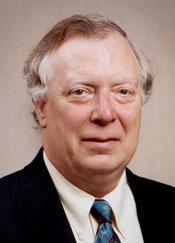Hageman Distinguished Lecturer in Agricultural Biochemistry

Dr. Dale E. BaumanLiberty Hyde Bailey Professor November 5-6, 2008Lecture: "Regulation of Fat Synthesis: Nutrigenomics and the Low-Fat Milk Syndrome" Colloquium: “Bioactive Fatty Acids in Milk Fat: Are all trans Fatty Acids the Same?" |
About the speaker
Dale E. Bauman, a native of Michigan attended Michigan State University. Beginning from a diary farm in Brown City, and a 4-H scholarship to MSU, he has become one of the world’s most cited agricultural scientists. His abiding interest has been in dairy cattle and he has made several major contributions to our fundamental understanding of the lactation process. As one award citation in the early 1980s noted, his work “played a major role in establishing the morphological, hormonal and biochemical changes that occur in the dairy cow... as she goes from a non-lactating to a lactating state.”
Professor Bauman obtained his PhD in Dairy Science from the University of Illinois in 1969. He remained there for a decade, then moved to Cornell University. His PhD work was on fatty acid synthesis in the mammary gland and his recent work has shown what are some specific dietary factors that control such synthesis at the level of gene regulation (Nutrigenomics).
While at Illinois he developed techniques for hormonal injection to induce lactation in both cows and heifers. Further refinement of our understanding of the hormonal response system ultimately resulted in the development of bovine somatostatin as a tool to enhance milk production by prolonging the life of mammary cells. This has opened whole new fields and also generated significant controversy. A recent publication of his documents the beneficial “carbon footprint” effects of BST use.
Recent research in Professor Bauman’s lab has been directed toward “functional foods”- using milk to deliver beneficial fatty acids, such as conjugated oleic acid into the human diet. He has also explored the impact of altered rumen fermentation processes on milkfat production. That topic is the subject of this year’s Hageman lecture.
In 1988 Dr. Bauman was elected to the National Academy of Sciences. From 1990 to 1994 he served on the Board and from 1994-1997 he was chair of the Board on Agriculture and Natural Resources, of that organization. Several important reports were prepared during his tenure there. Professor Bauman has received numerous awards and honors from professional scientific societies, beginning while he was a graduate student at MSU. He has received the Alexander von Humboldt award for research “considered of greatest significance to U.S. agriculture,”and the United States Department of Agriculture Superior Service Award. He served as president of the American Society of Nutritional Sciences, and just this year received their Dannon Institute award for mentoring of the next generation of researchers.
This year’s Thursday colloquium will focus on a new area in understanding of milk- the bioactive fatty acids, food for the next generation of researchers.